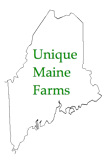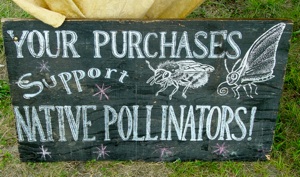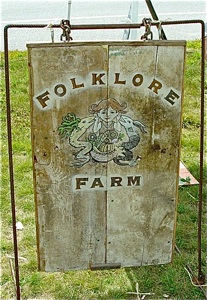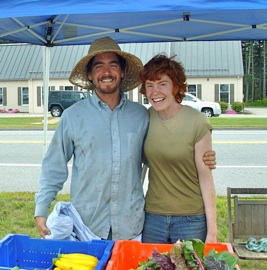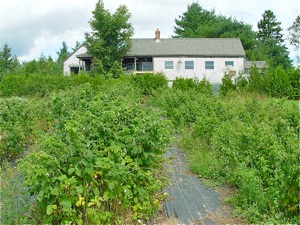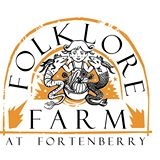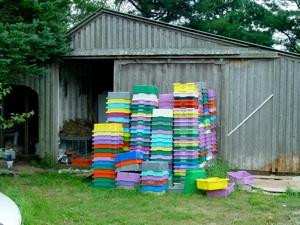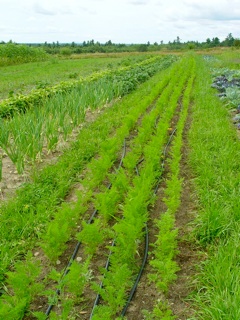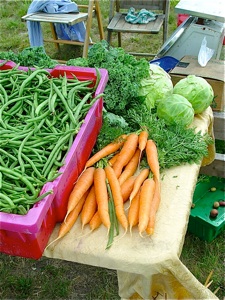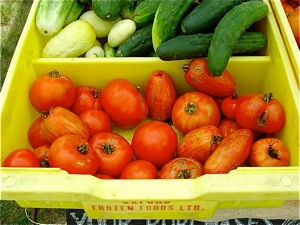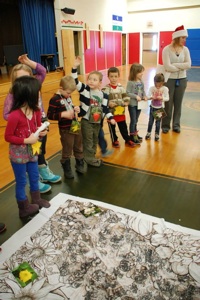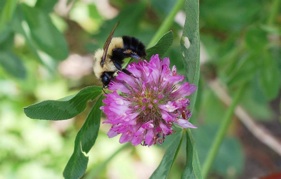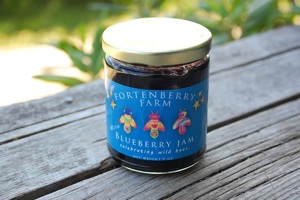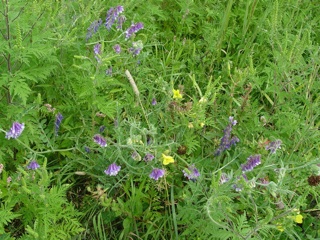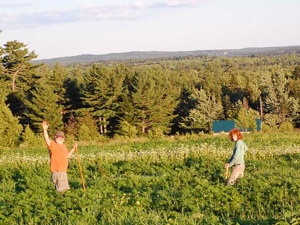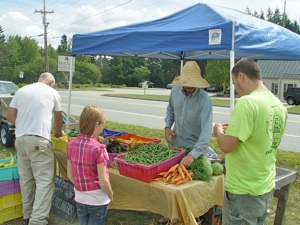Name: Folklore Farm at
Fortenberry Farm
Address: Nicole DeBarber
Michael Hayden
Folklore Farm
88 Pea Ridge Road
Columbia, Maine 04623
Phone: 207-546-0085
Email: folklore.farm@gmail.com
Facebook: Folklore Facebook Page
Name: Fortenberry Farm
Website:
fortenberryfarm.wordpress.com
Products and Services:
-outreach education
-promotion of native bee pollination
-native bee forage meadows
-classes and camps
-organic market garden
-wild blueberries
-senior share program
-organic blueberry jam and cranberry sauce
-Machias Marketplace - Wed. 10-5:30
-Columbia 4 Corners - Fri. 10-3
-workshops and collaborations
What Makes Folklore Farm at Fortenberry Unique?
Have you ever seriously considered the incredible possibilities that can materialize when people are willing to consider a bartering type of arrangement? The trading of livestock and agricultural goods has taken place in various societies for thousands of years. A very special bartering exchange has been formed between Folklore Farm and Fortenberry Farm in Columbia, Maine.
This bartering relationship has enabled Nicole DeBarber and Michael Hayden, a young couple, to be able to have a house in which to live and land on which to farm. It has also enabled Peter Collin, the farmer owning the land, to begin to fulfill a vision of successfully reaching out and encouraging awareness in the community about the importance of native pollinators and local food. It is an arrangement based on land sharing and collaborations.
For years Peter Collin was concerned about the significance of preserving some of the wild blueberry land in Washington County. So much of the blueberry barrens had been acquired by large commercial blueberry operations. Collin purchased Fortenberry Farm with the intention of turning the twenty-five acre property into an organic farm that would focus on conducting educational outreach. He wished to encourage the growth of vegetation that was found in wild meadows and that attracted native pollinators. Fortenberry Farm has been designated as a non-profit 501c3 and it has been successfully forming collaborations with several entities in the Downeast community.
Fortenberry Farm is abundant with meadow plants, wild flowers, and wild blueberries. If one has an opportunity to visit the laid-back property, there is an immediate awareness of the natural feel of the land. Whereas many of the blueberry fields in the area have been commercially maintained and seem quite uniform in a rather rugged and sterile type of way, the topography of Fortenberry Farm is distinct. All the blossoms, vibrant colors, lush patches of wildflowers, and busy insects contribute to a very welcoming, warm, and tranquil feeling.
It probably comes as no surprise that Peter Collin would have the interest and foresight to see a section of the blueberry barrens protected. As owner of Coastside Bio Resources in Stonington, he has always been interested in environmental-related research and undertakings. He recently has been involved in harvesting sea cucumbers and tapping their medicinal properties in helping to heal joint pain and stiffness. Coastside Bio Resources sells the sea cucumbers as pills and jerky. Working the land in a responsible manner has been equally intriguing as marine studies to Peter, so he is also committed to issues that are significant to farming in the Downeast area.
When the Pea Ridge Road blueberry farm was up for sale in Columbia, the concept of bartering and land sharing appealed to Peter Collin. The farm is situated in a remote location with lovely views of the open fields and forests. When Nicole DeBarber and Michael Hayden, became interested in such an arrangement, Peter’s vision of a small organic educational farm began to take shape. Nicole and Michael both had farming experience in New York state, and they were enthusiastic about Peter’s interest in spreading awareness about the importance of natural pollinators.
A bartering arrangement that was appealing to Collin and both DeBarber and Hayden was set in place. Nicole and Michael would have the opportunity to live rent-free at the farm and lease land on the property to grow their own organic vegetables for a market garden. Their farm operation is called Folklore Farm and they sell their produce at the Machias Marketplace on Wednesdays from 10 a.m. to 5:30 p.m. You will also find their produce under a tent in July through September at the Four Corners on Route One in Columbia.
Nicole has focused on bringing educational programs about natural pollinators to various schools in the Downeast area. Taylor Weiss, a FoodCorps service member, has assisted her on several occasions. Folkore Farm conducts a forty-five minute workshop for students from pre-K through eighth grade. With the guidance of participating educators, each student has the opportunity to decorate a native bee house that is equipped with small holes that serve as homes for the bees. This bee house can be erected in a school garden, local farm or in a common area such as a park. Some of the bee houses can be seen at Bad Little Falls Park in East Machias near the waterfalls.
There is a great deal for people to learn about
native pollinators. In the Columbia area where commercial blueberry farms are abundant, there are more than seventy species of native pollinators that are associated with the wild blueberries. Many of these species have had dramatic declines in numbers because of habitat loss and pesticide use. Commercial blueberry farmers have turned to managed honey bees to carry out the pollination on their fields. In recent years the honey bees have been dying in unusually large numbers. Scientists have explored various reasons for the colony collapses including the use of pesticides.
When Folklore Farm conducts their workshops in the local schools they are able to share information about the native pollinators in the area. An interactive pollination game is played. , Coloring activities often take place and resources about native pollinators are shared. The school presentations have a strong connection to where the children live since the area is so well-known for its wild blueberry production.
Folklore Farm’s Facebook page with its stunning photographs and numerous links to timely articles is an excellent educational resource. It shares a great deal of information about native bees and agricultural issues. In one of the posts, several suggestions were given about the type of plants that people can grow to help save the native bees.
Folklore Farm has reached out to form many collaborations in the community. They work with the Beehive Design Collective, which is an all-volunteer activist arts collective who create collaborative “anti-copyright” images for use as educational and organizing tools. A large fabric mural celebrating native bees that was created by the Beehive Design Collective has been incorporated into Folklore Farms’ educational workshops. The drill press that they are using to make the bee boxes was lent by Village Forge of Columbia Falls.
There has also been a collaboration with the University of Maine at Orono’s native bee team. Other organizations working on helping native bees in the Downeast area include Washington County: One Community, Downeast Farm to School, and We Can Dig It. Nicole was thrilled to take a native bee seminar at Eagle Hill Institute with entomologists Dr. Alison Dibble and Dr. Frank Drummond this past September. They have reached out to seniors through their Senior Share program through the Downeast Branch of the Maine Sea Coast Mission. They are presently selling organic blueberry jam and cranberry sauce at the Machias MarketPlace and Whole Life Natural Market & Cafe. The proceeds from the sale of these homemade items go to the Rose Gaffney school’s vegetable garden.
All the collaborations that have been formed as a result of the teamwork of Folklore Farm and Fortenberry Farm provide a great incentive for
individuals to consider bartering and land sharing arrangements. So much of this particular profile has been about symbiotic relationships on all different levels. There is the native bee who desires the nectar and pollen from the native plant and the plant that requires the pollination from the bee. Nicole and Michael desired a place to live and farm and live a purposeful existence. Peter, in turn, wished to see the land being farmed responsibly and dreamed of an educational outreach program. A whole lot of sharing has taken place. When Nicole heads out to the different schools to share her knowledge with the local children there is a striking similarity to the native bee on its travels that result in the enrichment of the local native plants.


